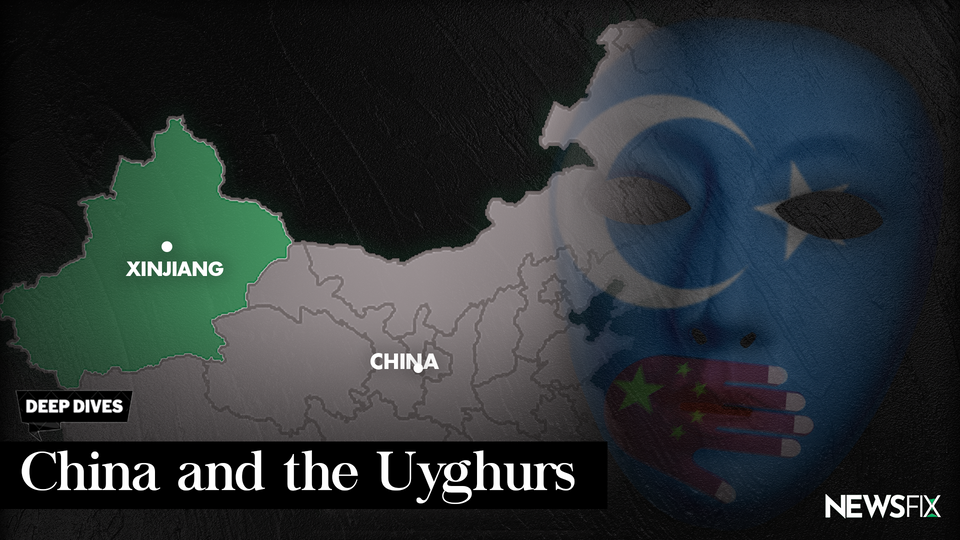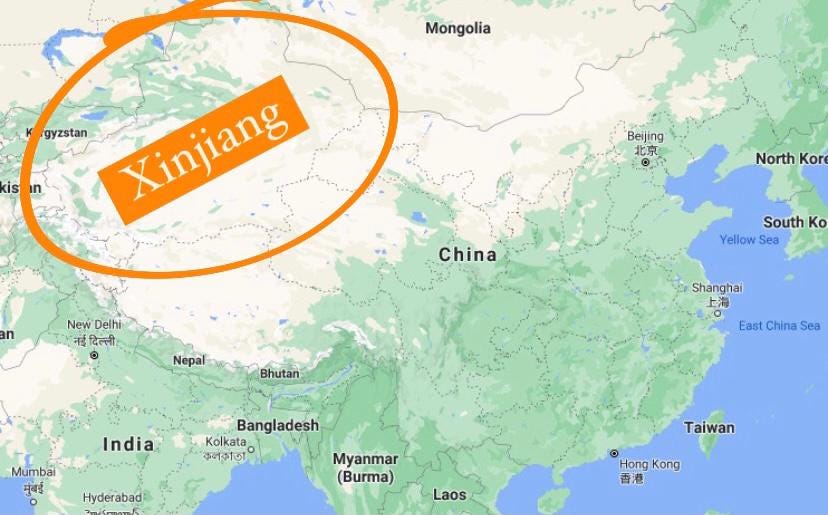🇨🇳 China and the Uyghurs

Who are the Uyghurs and why should you care about them?
Last year, then US Secretary of State Mike Pompeo described China’s treatment of the mostly Muslim ethnic majority as “truly the stain of the century.”
On the last full day of Trump’s presidency, the US described it as a genocide. Also last month, prominent members of the Jewish community in the UK compared it to the Holocaust.
Last summer, two thirds of voters on my Instagram poll said they had never heard of this ethnic minority. Rather than feel embarrassed, let’s feel informed.
Until tomorrow,
Hilary
*Note: ‘Uyghur’ is pronounced ‘wee-gur,’ and some media spell it as ‘Uighur’
*This piece was originally published on February 7, 2021
WHO ARE THE UYGHURS?
Uyghurs are a predominantly Muslim ethnic minority in China.
They speak their own language, which is very similar to Turkish, and have their own distinct culture to the rest of China.
According to the World Uyghur Congress, more than 1.6 million Uyghurs live outside China, mostly in central Asia.
Amnesty International claims that if Uyghurs in China take calls from their families abroad they risk being arrested.
WHERE ARE THEY BASED?

Uyghurs in China are predominantly based in the far-western province of Xinjiang.
*Note: Xinjiang is pronounced ‘shin-jang’.
Xinjiang is home to an estimated 22 million people out of the 1.4 billion living in the whole of China. Approximately 11 million of those are Uyghurs, just under half of the region’s population.
More than four times the size of California, approximately 83% of Xinjiang is covered by either desert or mountain ranges.
Xinjiang borders Russia, Tajikistan, Mongolia, Kyrgyzstan, Kazakhstan, Afghanistan, Pakistan and India.
There have long been tension between Uyghurs and Chinese officials in Beijing. Back in the 1930s and 40s, today’s Xinjiang region experienced brief and partial independence, whereby an ‘East Turkestan Republic’ was formed.
For more than 60 years, large numbers of Han Chinese have migrated to the region.
Many Uyghur activists today still refer to the area as ‘East Turkestan’.
CHINA AND RELIGION
China is officially an atheist country. However, according to the CIA around 18% of the population identify as Buddhist, 5% as Christians. Less than 2% of citizens in China are Muslim.
‘Han’ Chinese are the majority ethnic group in China. According to CNN, 56 ethnic groups are officially recognised in China. Of them, all but one - Han - are minorities.
Han Chinese account for roughly 92% of China’s 1.4 billion people.
UYGHUR ATTACKS ON CHINA?
Back in 2002, the East Turkestan Islamic Movement were classed as a terrorist organisation by the Chinese government.
In 2009, almost 200 Han and Uyghur people were killed after a mass protest broke out. During the unrest, some Han Chinese were beaten to death, and cars, houses and shops were set on fire. Internet access across Xinjiang was cut off for almost a year as a result.
In 2013, an Islamist Uyghur group claimed responsibility for ploughing through a group of pedestrians near Beijing’s famous Tiananmen Square.
In May 2014, dozens were killed when explosions went off in an open-air market in Xinjiang. The same year, 29 were “hacked to death,” and 100 others were injured in a city outside of Xinjiang. Authorities said Uyghur jihadists were responsible.
In documents leaked to the New York Times, President Xi Jinping is said to have authorised officials to respond with “absolutely no mercy”.
A few experts say some of the attacks are nothing to do with religion, but ethnic oppression. Others also say that while Beijing blames Uyghurs, there are disputes over how many of these attacks are carried out by foreign militant groups.
CRACKDOWN
Many Uyghurs who have managed to speak out say there is an ongoing “cultural genocide” happening.
In 2017, long beards and head coverings were banned as well as “choosing names in an abnormal way.”
More than a million Han Chinese workers have been sent to live with Uyghur families on a mandatory basis to monitor their cultural and religious practices.
Satellite images - which have been widely reported in the media - have also suggested many mosques and Uyghur cemeteries have been destroyed in recent years.
DETENTION CAMPS
The US State Department estimates that up to two million ethnic minorities and Uyghurs have been detained in numerous detention camps across the region since 2017.
After initially denying the existence of these camps, Chinese officials in Beijing now say they are “vocational training centres,” and are a necessary step in stopping the spread of Islamic extremism.
Some of the treatment Uyghurs are allegedly subjected to include;
- Torture
- Physical and sexual abuse
- Forced labour
- Political indoctrination
- Food and sleep deprivation
- Pressure to pledge loyalty to China’s Communist Party
TREATMENT OF UYGHUR WOMEN
Many reports allege Uyghur women are being forced to take birth control to curb Uyghur population increases.
Did you know? Back in the 1970s, a one-child policy was implemented across China to control population growth. This was relaxed in recent years, and in 2015 two children per household was officially permitted.
Last month, the BBC published harrowing accounts of mass rape and sexual abuse. One woman, who was in an internment camp but is now in the US, said she was tortured and gang-raped three times, “each time by two or three men”.
Another woman documented her forced role at the camps;
“My job was to remove their clothes above the waist and handcuff them so they cannot move… then I would leave the women in the room and a man would enter - some Chinese man from outside or policeman. I sat silently next to the door, and when the man left the room I took the woman for a shower."
US STANCE
On the last day of President Trump’s administration, the government described the treatment of Uyghur Muslims as “genocide and crimes against humanity”.
Did you know? ‘Genos’ is a Greek word for race, ‘cide’ is a latin word for killing.
President Biden - who before being elected said Uyghurs were being held in “concentration camps” - said in 2019 the US should immediately go to the UN to seek sanctions against China.
During the Trump era, his Secretary of State Mike Pompeo was very vocal in speaking out on China’s treatment of Uyghurs, once describing it as a “human rights violation on a scale we have not seen since World War II”.
Last summer, the Uyghur Human Rights Policy Act was signed into law by President Trump, after passing overwhelmingly in both the House and Senate.
The Act allows for those responsible for the treatment of Uyghurs to be sanctioned, including visas revoked and entry to the US blocked.
Worth noting: The bill does also give the president the ability to not impose the sanctions if it is believed it would go against America’s national interest.
However, President Trump is also accused of telling Chinese President Xi Jinping to “go ahead” building detention camps. The revelation came from a book written by John Bolton, Trump’s previous national security adviser.
OTHER INTERNATIONAL REACTION
There has been widespread condemnation of China’s policy towards the Uyghur population, particularly from the West.
The same week the US determined there was a “genocide” happening in Xinjiang, there was an important vote in the UK’s House of Commons.
The vote was on whether or not the UK government should reconsider trade deals with countries who were found to be committing genocide by the courts.
The proposed amendment was narrowly defeated by a majority of just 11 - 319 to 308. Why is that significant? Because Boris Johnson’s Conservative party currently have a majority of MPs, meaning a lot from his own party voted in favour of the idea.
Separately, in September a UK Tribunal was launched, seeking to independently investigate “ongoing atrocities and possible genocide” against the Uyghur people.
Last summer, China’s Ambassador to Ireland told an Irish Times journalist the widespread reports were “totally groundless” and “fabricated with its own political intention”.
Interestingly, last July at least 37 countries who do business with China signed a letter defending Beijing’s policies in the region. Nearly half of them were Muslim countries - including Pakistan, Saudi Arabia, the UAE, Qatar and Syria.
COTTON IN XINJIANG
Did you know that cotton in Xinjiang makes up 85% of China’s cotton, and a fifth of the world’s total supply?
A recent BBC investigation found hundreds of thousands of Uyghurs are being sent to cotton fields, amid accusations of forced labour.
The Chinese government dismissed the accusations of forced labour, saying they were “completely fabricated”.
In July, a coalition of organisations and trade unions published a list of fashion brands they claim source cotton from Xinjiang.
“Virtually the entire apparel industry is tainted by forced Uyghur and Turkic Muslim labour.” - End Uyghur Forced Labour organisation
What brands did they mention? Altogether 38 fashion brands were mentioned, including Abercrombie and Fitch, Adidas, Calvin Klein, Gap, H&M, Lacoste, M&S, Nike, Patagonia, Polo Ralph Lauren, Tommy Hilfiger, Victoria’s Secret and Zara.
Aside from the fashion industry, Disney also faced backlash last year for filming parts of Mulan in Xinjiang and thanking the region’s authorities in the movie’s credits.
JEWISH SUPPORT FOR UYGHURS
Holocaust Remembrance Day in late January was used by some leading figures in the UK’s Jewish community to shine a light on the plight of Uyghur Muslims.
“We have been there, we have experienced this. The difference now is that there is still time to act. Jews have the moral authority and a moral duty to speak out now. Never again should civil society, businesses and decision-makers be silent as in the 1930s.” - Mia Hasenson-Gross, executive director of René Cassin, a Jewish human rights organisation
Another prominent figure said - in a letter to Prime Minister Johnson - while the Jewish community is “always extremely hesitant to consider comparisons with the Holocaust,” there are similarities to China today and Nazi Germany 75 years ago.
WANT TO KNOW MORE?
Below is an award winning Vice documentary from 2019, where reporter Isobel Yeung goes to Xinjiang undercover. A really fascinating watch. Time: 31:47
Don’t have that much time? This piece from The Economist (8:44) is also very informative, and well worth watching.
